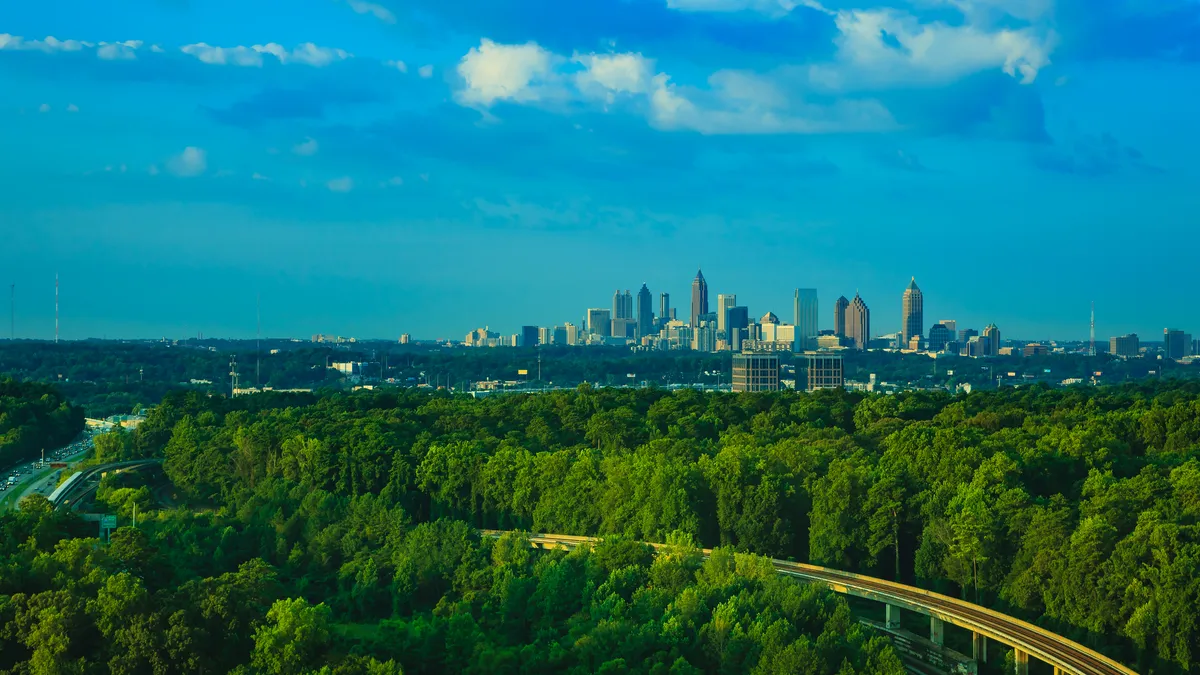Dive Brief:
- Activists vandalized a construction executive’s home and personal vehicles, the latest in a string of attacks by a local group protesting a $90 million, 85-acre police, fire and public safety training center in Atlanta.
- A group calling itself the Forest Defenders claimed responsibility for vandalism at the Birmingham, Alabama-area home of Miller Gorrie, chairman of Birmingham-based Brasfield & Gorrie, the prime contractor on the controversial project, according to the Atlanta Journal-Constitution newspaper.
- In a statement emailed to Construction Dive, Brasfield & Gorrie said it was just one of several recent attacks aimed at the firm. “Brasfield & Gorrie, its employees, and their families have been the targets of criminal acts of trespassing, vandalism, and harassment over the last several months in relation to the construction of a training center for police and first responders in Atlanta,” the company said. “The incident in September at the home of Miller Gorrie was the latest in a string of events that have involved criminal activity far surpassing the bounds of peaceful protest.”
Dive Insight:
The police training center campus was approved by Atlanta City Council in September 2021 at the site of the Old Atlanta Prison Farm in neighboring DeKalb County. But neighbors have pushed back against the potential smoke and noise from the facility, which is slated to include a shooting range, mock city and burn building, among other aspects of the project.
The Forest Defenders activists have protested against the potential environmental impacts to the surrounding woodlands, as well as the nearby South River, and have attracted national media attention, including a profile in the New Yorker.
According to the Atlanta Journal-Constitution, those activists have sabotaged machinery at the jobsite, built shelters in trees to interrupt construction and lobbed rocks and Molotov cocktails at police and contractors.
On an anonymous blogging platform, a poster recently took credit for the attack on Gorrie’s home and listed his address online. The post described painting walls and statues at the house, as well as pouring lacquer thinner on vehicles and etching “stop cop city” on the windshield.
The message concluded, “on the driveway we left a message: c u soon. it’s up to you if we make good on this promise … if your dumb company drops the cop city contract then stylish people like us wouldn’t feel so compelled to visit you ever again.”
B&G offices in Atlanta and Cobb County have been vandalized as well, according to the Atlanta Journal-Constitution, and seven people were arrested after entering a company jobsite at Georgia State University last summer. Activists also reportedly protested at the church of a B&G executive, passing out flyers that listed the executive’s wife and children by name, and said the executive was “choosing to serve mammon over the Lord.”
Controversial projects come with risk
Carol Sigmond, a construction attorney at New York City-based law firm Greenspoon Marder, said the episode illustrates the additional risks construction companies can face when working on controversial public projects.
“The first risk is the assault to your workforce, and whether people are getting hurt,” Sigmond said. “But then you have property and financial risk, if the project itself is damaged, and who pays for the delays. That can impact your insurance cost, and ultimately, drive up the price of the project.”
The Atlanta Journal-Constitution reported the attacks have extended to a subcontractor as well, with the Forest Defenders taking credit for vandalism of at least nine of its offices in Oakland, California; Kansas City, Missouri; Columbus, Ohio; Tallahassee, Florida; Erie, Pennsylvania; and New York City.
Both local law enforcement and the FBI are reportedly investigating the case. Sigmond said the incidents also underline the broader trend of civic protests slipping into violence, as happened in the wake of George Floyd’s murder in 2020.
“You really have to separate the protests from the violence, and that's a very critical thing,” Sigmond said. “You've seen it from both the left and the right. And what I really find most troubling of all is my suspicion that at its core, this is a different kind of criminal element.”














